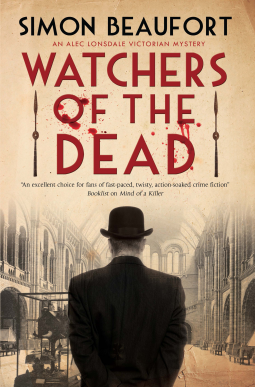
Watchers of the Dead by Simon Beaufort
Genre: Historical mystery
Publisher: Severn House Publishers
Publication Date: 2019
Summary: (from blurb)
“All Londoners will see what the Watchers are capable of on Christmas Eve …” December 1882. Attending the opening of the new Natural History Museum, Pall Mall Gazette reporter Alec Lonsdale and his colleague Hulda Friederichs are shocked to discover a body in the basement, hacked to death. Suspicion immediately falls on a trio of cannibals, brought over from the Congo as museum exhibits, who have disappeared without trace. Alec however has his doubts – especially when he discovers that three other influential London men have been similarly murdered. When he and Hulda discover a letter in the victim’s home warning of a catastrophic event planned for Christmas Eve, the pair find themselves in a race against time to discover who exactly the Watchers are and what it is they want …
My thoughts:
Quite a few reviewers have noted that this book moves a bit slowly. I noticed that as well, but honestly, this issues didn’t diminish my enjoyment of it. I don’t expect historical mysteries to move at a neck-breaking speed.
There’s at least one more Alec Lonsdale novel prior to Watchers of the Dead, but it is not necessary to read the books in order. This book works as a standalone.
What I enjoyed:
Alec and Hulda
Alec is an extremely sympathetic character. He’s a journalist with The Pall Mall Gazette, a respected London newspaper. Though his fiancee’s father disdains Alec’s investigations into the murder, and repeatedly orders him to cease and desist, Alec refuses. Multiple people are dead. The police have been ordered to declare the deaths natural when they were clearly murder. If an investigative journalist doesn’t snoop around, the dead will not receive justice. He has principles and he’s clearly bothered by this injustice and the exploitation of humans.
Hulda is quite a character. One of my notes reads, “I like her. I think.” It took me a while to warm up to her, but she won me over with her dogged determination, intelligence, and blunt–often abrasive–words. It’s fairly obvious that she and Alec are better suited than Alec and his intended. Oh, and baking allows her to think, she tells others in chapter three, as she presents a plate of lavender biscuits to the Gazette office staff. Questionable flavor aside, anyone who brings baked goods to work is a winner with me.
The historical details
Beaufort does a great job making the Victorian era come to life. Obviously, the author’s done a lot of research. We read about everything from the public opinion of evolutionary theory to London’s dismal December weather to the newly-opened Natural History Museum’s interior to the the infamous Broadmoor where poor Maclean lives.
Many of the characters are actual historical persons. It’s really interesting to see how Beaufort works with what is known about these people. This is especially true of Hulda, who was an actual London journalist at the Gazette.
The journalism
Years ago, I worked in the local newspaper’s newsroom as a “gofer.” (Person who made coffee, “ran copy” between typesetters and newswriters, did dinner runs for late night employees–usually the sports writers–and answered the phone: you get the idea.) When Beaufort describes the Gazette building, it reminded me so much of my old job site. And yes, the editors could be quite quirky and strongly opinionated, just like those at the Gazette.
The competition between the London papers feels familiar, too, as does the differing attitudes toward news gathering. Some, like Voules, write whatever sells, no matter how outrageous and divorced from the truth. Others, like Lonsdale and Hulda, feel a moral obligation to print the truth and only the truth. This isn’t easy to do, especially when powerful people distort facts, lie, or refuse to speak at all. It often puts the journalists at risk, too. The physical methods of journalism may have changed, but certain other things have not.
These are all strong aspects of the book.
Where the book falters, though, is the actual mystery. It’s good but not spectacular. The reasons for the killings feel weak. I would’ve liked a bit more insight into this aspect.
The plot does move rather slowly, though it builds up steam in the last half of the book.
Overall, though, I truly enjoyed this novel and look forward to reading more about Alec Lonsdale and Hulda Friederichs.
